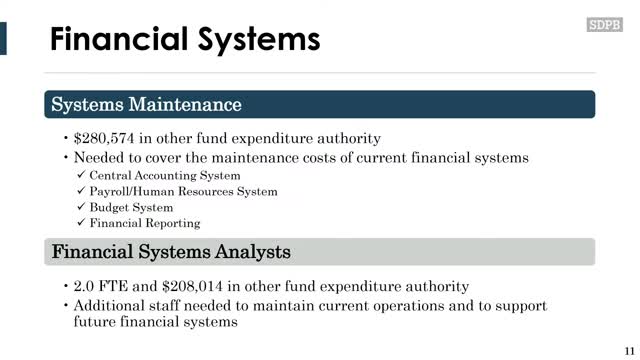Investment council reports 6.02% FY return, says long‑term contrarian approach remains intact
Get AI-powered insights, summaries, and transcripts
Subscribe
Summary
The State Investment Council reported assets above $20 billion, a 6.02% fiscal‑year return (below benchmark) and defended a long‑term contrarian, lower‑equity stance while outlining compensation and staffing strategies to retain investment talent.
The South Dakota Investment Council briefed the Joint Appropriations Committee on the council's portfolio performance, strategy and staffing, reporting $20 billion-plus in assets under management and a fiscal‑year return of 6.02% against a capital markets benchmark of 13.81%.
Long‑term performance and strategy: Council Chair Lauren Kepsel and State Investment Officer Matt Clark said the council pursues a contrarian strategy that reduces public‑market exposure when valuations are high and increases allocations to private assets and cash for protection. Clark said that approach has meant the council "reduced significantly our exposure to the public markets" in recent years and currently results in a large cash position; Kepsel noted the council's 20‑year compound outperformance versus the benchmark but acknowledged underperformance in the last few years because of the council's conservative positioning.
Private assets and recent drag: The council identified private real estate and private equity partnerships as the primary sources of underperformance against public market benchmarks for the most recent period; real estate partnerships in particular lagged publicly traded REIT indexes because of appraisal and valuation smoothing in partnerships that can cause lagged returns until those firms realize gains through sales.
Compensation, staffing and costs: Kepsel described the council's cost and compensation model: internally managed funds run at roughly 10 basis points (0.10%) of assets; total costs including external managers run at about 31 basis points. The council seeks to retain investment staff through competitive incentives. Clark and Kepsel said the investment office's compensation structure includes multi‑year incentives (1‑, 4‑ and 10‑year components) and the potential for bonuses up to 225% of base pay under stretch performance targets; the council targets roughly 70% of private‑sector median pay (adjusted for South Dakota cost of living) for base compensation plus variable incentives.
Tobacco settlement and trust funds: The council also reviewed the Education Enhancement Trust Fund and other trusts funded by the Master Settlement Agreement (tobacco payments), noting the trust fund securitization and that the tobacco bond payoff in coming years will change related cash flows to the Education Enhancement Trust Fund.
Why it matters: The Investment Council manages assets that underpin retirement and trust funds used for pensions, education and other state obligations. Council leaders argued that disciplined, long‑term contrarian investing and tight cost control produced strong long‑term results, even if short‑term returns lagged public markets.
Questions and transparency: Legislators asked about the council's exposure to commodities and crypto (council said no direct commodity holdings and no plan to enter crypto as an investable asset), the size of cash allocations (chair said roughly 30% cash position in some periods) and how compensation targets compare to private industry. Kepsel and Clark said they would provide additional documentation on incentives and the expected return on compensation investments upon request.
